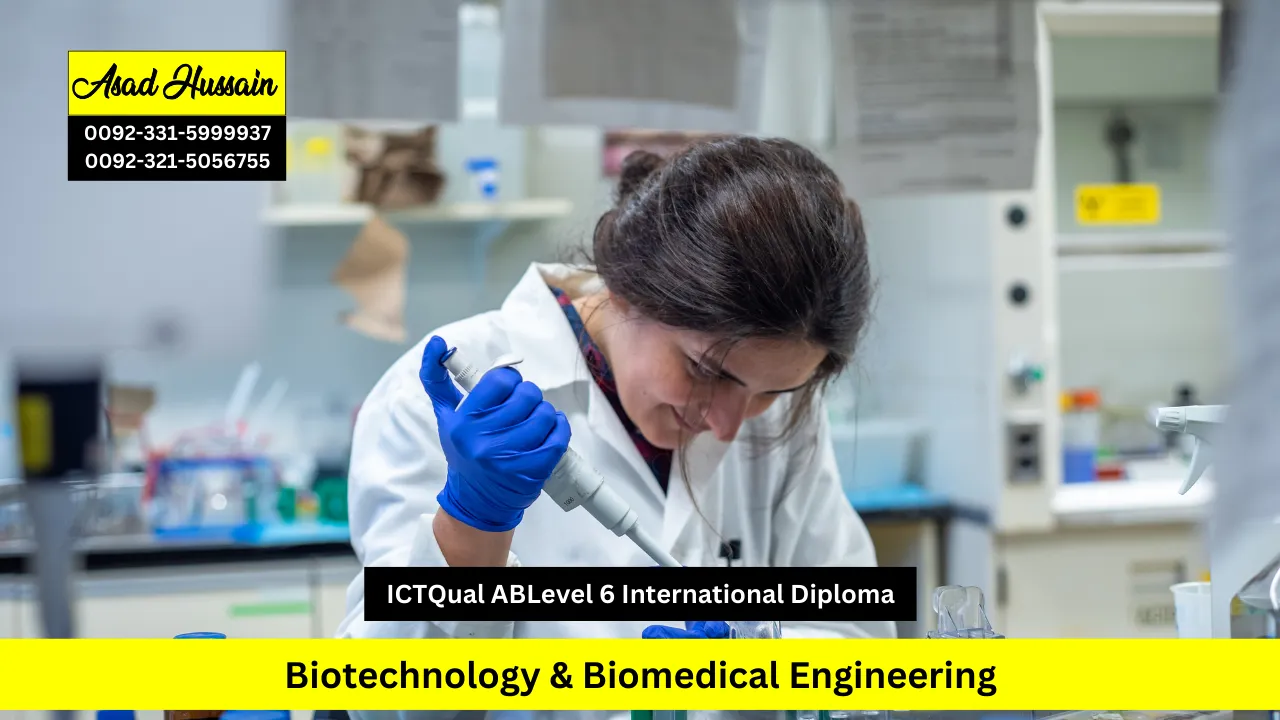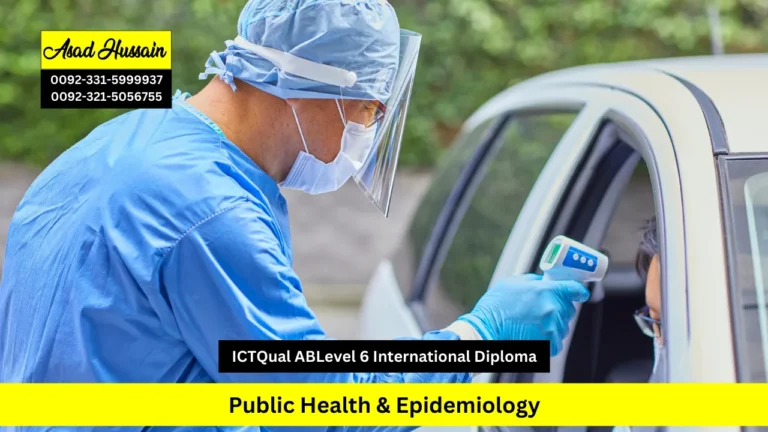Biotechnology and biomedical engineering are at the forefront of modern healthcare, research, and technological innovation. These interdisciplinary fields combine principles of biology, engineering, and technology to develop advanced medical devices, therapeutic solutions, and diagnostic tools that improve human health and quality of life. The ICTQual AB Level 6 International Diploma in Biotechnology & Biomedical Engineering is designed to provide learners with a comprehensive understanding of these cutting-edge disciplines, equipping them with the knowledge and practical skills required to excel in laboratories, research facilities, and healthcare technology environments.
ICTQual AB Level 6 International Diploma in Biotechnology & Biomedical Engineering covers key areas including molecular biology, genetic engineering, biomedical instrumentation, tissue engineering, bioprocessing, and regulatory compliance in biotechnology applications. Learners will gain hands-on experience in laboratory techniques, biomedical device design, data analysis, and experimental research, ensuring a strong integration of theory and practice.
Graduates will be prepared for a variety of career paths, including roles in biotechnology companies, healthcare technology firms, research institutions, and clinical laboratories. The program also develops competencies in project management, ethical considerations in biomedical research, and innovation in technology-driven healthcare solutions. This diploma provides a strong foundation for further specialization or postgraduate studies while enhancing employability in the rapidly evolving global biotechnology and biomedical engineering sectors.
Program Highlights
Study Units
Year 1: Foundation in Biotechnology & Biomedical Engineering
- Introduction to Biotechnology and Biomedical Engineering
- Fundamentals of Human Anatomy and Physiology
- Principles of Molecular Biology and Genetics
- Biochemistry for Life Sciences
- Microbiology and Infection Control
- Laboratory Safety and Quality Assurance
- Principles of Pharmacology and Therapeutics
- Mathematics and Statistics for Biomedical Applications
- Computer Applications in Biotechnology
- Communication Skills for Science and Healthcare Professionals
- Introduction to Research and Evidence-Based Practice
- Ethics and Professional Conduct in Biomedical Sciences
Year 2: Intermediate Biotechnology & Biomedical Engineering Applications
- Genetic Engineering and Recombinant DNA Technology
- Cell Biology and Tissue Engineering
- Clinical Biochemistry and Diagnostic Techniques
- Immunology and Serology
- Instrumentation and Analytical Methods in Biotechnology
- Microbial Biotechnology and Industrial Applications
- Molecular Diagnostics and Laboratory Techniques
- Bioprocess Engineering and Biomanufacturing
- Data Analysis and Biomedical Informatics
- Health and Safety in Biomedical Laboratories
- Leadership and Teamwork in Scientific Practice
- Applied Research Methods and Experimental Design
Year 3: Advanced Specialisation and Professional Application
- Advanced Molecular Biology and Genomics
- Advanced Immunology and Clinical Applications
- Biomedical Device Engineering and Design
- Advanced Bioprocessing and Biopharmaceutical Production
- Stem Cell Technology and Regenerative Medicine
- Bioinformatics and Computational Biology
- Clinical Trial Design and Regulatory Compliance
- Advanced Laboratory Techniques and Automation
- Quality Management and Risk Assessment in Biomedicine
- Emerging Technologies in Biotechnology and Healthcare
- Research Project / Dissertation
- Professional Practice and Practical Competency Assessment
Applicants must meet the following entry requirements to ensure they are adequately prepared for the advanced study and practical demands of biotechnology and biomedical engineering:
Age Requirements
- Applicants should be at least 18 years old to ensure readiness for adult learning and professional practice.
- Mature learners with relevant experience are also encouraged to apply.
Educational Requirements
- Completion of a relevant Level 5 diploma or equivalent in biotechnology, biomedical sciences, engineering, or healthcare.
- Students with strong backgrounds in science, mathematics, or technology disciplines will benefit from foundational knowledge in these areas.
Professional Experience
- Applicants with laboratory, research, or healthcare industry experience will have practical advantages in understanding complex concepts.
- Professionals seeking career advancement in biotechnology or biomedical engineering can leverage this course to enhance technical expertise.
English Language Proficiency
- A minimum IELTS score of 5.5 or equivalent is required for non-native English speakers to ensure comprehension of technical material.
- Competency in reading, writing, and communication is essential for laboratory documentation, research reporting, and professional interaction.
By meeting these entry requirements, learners will be fully prepared to succeed in the program and gain the skills necessary to advance in the biotechnology and biomedical engineering sectors.
The ICTQual AB Level 6 International Diploma in Biotechnology & Biomedical Engineering equips learners with comprehensive knowledge, practical skills, and professional competencies essential for a successful career in biotechnology, biomedical engineering, and healthcare innovation. The program emphasizes both theoretical understanding and hands-on application, ensuring graduates can contribute effectively in academic, research, and industrial environments.
Year 1: Foundation in Biotechnology & Biomedical Engineering
Introduction to Biotechnology and Biomedical Engineering
- Explain key concepts, principles, and applications of biotechnology and biomedical engineering.
- Identify current trends and innovations in life sciences and medical technologies.
- Recognize the interdisciplinary nature of biotechnology and its role in healthcare solutions.
Fundamentals of Human Anatomy and Physiology
- Describe the structure and function of human body systems.
- Apply anatomical and physiological knowledge to biomedical contexts.
- Interpret physiological data relevant to medical and research settings.
Principles of Molecular Biology and Genetics
- Analyze the structure, function, and regulation of DNA, RNA, and proteins.
- Demonstrate understanding of Mendelian and molecular genetics principles.
- Apply genetic knowledge to experimental and clinical scenarios.
Biochemistry for Life Sciences
- Explain biochemical pathways and molecular interactions in cells.
- Apply biochemical principles to laboratory investigations.
- Analyze the role of enzymes, metabolites, and macromolecules in cellular processes.
Microbiology and Infection Control
- Identify microorganisms and their relevance to health and disease.
- Apply infection control and aseptic techniques in laboratory settings.
- Evaluate microbial contamination risks in biomedical environments.
Laboratory Safety and Quality Assurance
- Demonstrate knowledge of laboratory safety protocols and regulations.
- Implement quality assurance practices in experimental procedures.
- Assess potential hazards and ensure compliance with safety standards.
Principles of Pharmacology and Therapeutics
- Explain pharmacokinetics and pharmacodynamics of key drugs.
- Assess therapeutic applications in clinical and research contexts.
- Apply principles of drug action to experimental design and evaluation.
Mathematics and Statistics for Biomedical Applications
- Apply statistical methods to analyze experimental and clinical data.
- Use mathematical modeling in biomedical problem-solving.
- Interpret quantitative results to support research findings.
Computer Applications in Biotechnology
- Utilize bioinformatics tools and software for data analysis.
- Demonstrate proficiency in data management and computational applications.
- Apply computational approaches to support experimental research.
Communication Skills for Science and Healthcare Professionals
- Demonstrate effective written and oral communication in scientific contexts.
- Prepare scientific reports, presentations, and documentation.
- Engage in professional discourse with colleagues and stakeholders.
Introduction to Research and Evidence-Based Practice
- Explain research methodologies and evidence-based principles.
- Critically appraise scientific literature relevant to biotechnology.
- Apply basic research skills in experimental planning and data interpretation.
Ethics and Professional Conduct in Biomedical Sciences
- Understand ethical considerations in biomedical research and practice.
- Apply professional conduct standards in laboratory and clinical settings.
- Evaluate ethical dilemmas and propose responsible solutions.
Year 2: Intermediate Biotechnology & Biomedical Engineering Applications
Genetic Engineering and Recombinant DNA Technology
- Demonstrate techniques in DNA manipulation and cloning.
- Analyze recombinant DNA applications in medicine and industry.
- Evaluate ethical and safety implications of genetic engineering.
Cell Biology and Tissue Engineering
- Explain cellular structure, signaling, and function in tissue systems.
- Apply tissue engineering techniques for regenerative medicine research.
- Assess experimental data in cell culture and tissue regeneration studies.
Clinical Biochemistry and Diagnostic Techniques
- Perform biochemical assays and interpret clinical results.
- Evaluate diagnostic tests for disease detection and monitoring.
- Integrate biochemical knowledge into laboratory practice.
Immunology and Serology
- Describe immune system components and their functions.
- Conduct serological assays and interpret immunological data.
- Apply immunological principles in disease detection and therapy evaluation.
Instrumentation and Analytical Methods in Biotechnology
- Operate laboratory instruments accurately and safely.
- Apply analytical methods to measure biological and chemical parameters.
- Evaluate instrument data to support research and diagnostic work.
Microbial Biotechnology and Industrial Applications
- Apply microbial techniques in industrial biotechnology.
- Analyze microbial processes for bioproduction and bioremediation.
- Assess quality and efficiency in microbial-based applications.
Molecular Diagnostics and Laboratory Techniques
- Perform molecular diagnostic tests using PCR, ELISA, and sequencing.
- Analyze genetic and molecular data for clinical and research purposes.
- Evaluate laboratory protocols for accuracy and reliability.
Bioprocess Engineering and Biomanufacturing
- Understand principles of bioprocessing and large-scale production.
- Design experiments for biomanufacturing optimization.
- Analyze process efficiency and quality control metrics.
Data Analysis and Biomedical Informatics
- Apply bioinformatics and statistical tools to biomedical datasets.
- Interpret complex data for clinical and research decision-making.
- Integrate computational analysis into laboratory workflows.
Health and Safety in Biomedical Laboratories
- Implement safety protocols for high-risk laboratory environments.
- Assess risks associated with chemical, biological, and mechanical hazards.
- Monitor compliance with health and safety regulations.
Leadership and Teamwork in Scientific Practice
- Demonstrate collaborative problem-solving and project management skills.
- Lead small teams in laboratory and research projects.
- Apply leadership principles to ensure effective scientific practice.
Applied Research Methods and Experimental Design
- Design experiments based on scientific hypotheses.
- Apply quantitative and qualitative research methods in biomedical contexts.
- Critically evaluate experimental results and propose improvements.
Year 3: Advanced Specialisation and Professional Application
Advanced Molecular Biology and Genomics
- Conduct advanced genomic analysis using modern techniques.
- Interpret genomic data for research and clinical applications.
- Evaluate innovations in molecular biology for biotechnology advancement.
Advanced Immunology and Clinical Applications
- Analyze complex immune responses and disease mechanisms.
- Apply immunological principles to therapeutic and diagnostic strategies.
- Design experiments targeting immune modulation and therapy development.
Biomedical Device Engineering and Design
- Design and prototype biomedical devices for clinical applications.
- Assess device performance and regulatory compliance standards.
- Integrate engineering principles into healthcare solutions.
Advanced Bioprocessing and Biopharmaceutical Production
- Optimize bioprocessing techniques for large-scale production.
- Evaluate biopharmaceutical manufacturing efficiency and quality.
- Apply regulatory guidelines in biopharmaceutical production workflows.
Stem Cell Technology and Regenerative Medicine
- Demonstrate knowledge of stem cell biology and therapeutic applications.
- Apply stem cell techniques in regenerative medicine research.
- Assess clinical potential and ethical considerations in stem cell use.
Bioinformatics and Computational Biology
- Apply computational methods to analyze biological data.
- Utilize bioinformatics tools for genomics, proteomics, and systems biology.
- Integrate computational findings into experimental and clinical decision-making.
Clinical Trial Design and Regulatory Compliance
- Design and manage clinical trials following regulatory standards.
- Evaluate trial data for safety, efficacy, and ethical compliance.
- Apply clinical research guidelines to ensure quality and reliability.
Advanced Laboratory Techniques and Automation
- Implement high-throughput and automated laboratory techniques.
- Analyze complex experimental results with precision.
- Maintain accuracy, reproducibility, and compliance in advanced labs.
Quality Management and Risk Assessment in Biomedicine
- Apply quality management systems in laboratory and clinical settings.
- Conduct risk assessments to mitigate operational and research hazards.
- Evaluate processes to ensure regulatory and safety compliance.
Emerging Technologies in Biotechnology and Healthcare
- Analyze cutting-edge technologies such as CRISPR, AI in healthcare, and nanobiotechnology.
- Assess the practical applications of emerging innovations.
- Propose solutions integrating new technologies in biomedical research.
Research Project / Dissertation
- Conduct independent research addressing relevant scientific questions.
- Apply experimental, analytical, and computational skills in project execution.
- Present findings in a professional dissertation format with critical analysis.
Professional Practice and Practical Competency Assessment
- Demonstrate competence in laboratory, research, and clinical settings.
- Apply professional standards and ethical conduct in practical scenarios.
- Evaluate performance through structured assessment and reflective practice.
Upon completion of this program, learners will possess advanced theoretical knowledge, practical laboratory skills, and professional competencies to excel in biotechnology, biomedical engineering, and healthcare industries worldwide. Graduates will be prepared for careers in research, clinical diagnostics, biomanufacturing, and emerging biotech innovations, making them highly competitive in the global scientific community.
The ICTQual AB Level 6 International Diploma in Biotechnology & Biomedical Engineering is designed for learners seeking to advance their expertise in biotechnology, biomedical research, and healthcare technology. It is suitable for a diverse range of professionals and students who aim to develop advanced technical, analytical, and research skills. This course equips learners to excel in laboratory, clinical, and industrial settings while contributing to innovation and evidence-based practices.
Educational Instructors and Trainers
- Enhance teaching and training methods by integrating the latest biotechnology and biomedical engineering techniques.
- Gain advanced knowledge to design curriculum and practical laboratory sessions that reflect industry standards.
Environmental Advocates and Activists
- Apply biotechnological and biomedical tools to monitor environmental health and assess human impact on ecosystems.
- Develop practical skills for conducting research and data analysis in environmental health and sustainability projects.
Students and Recent Graduates
- Acquire hands-on laboratory and research skills that complement academic knowledge and improve employability.
- Gain exposure to interdisciplinary applications, preparing for careers in biotechnology companies, healthcare technology, or research institutions.
Career Changers
- Transition from other industries into biotechnology, biomedical research, or healthcare technology roles with confidence.
- Develop practical and theoretical competencies to quickly adapt to laboratory, clinical, or industrial settings.
Policy Makers and Regulators
- Understand advanced biotechnological and biomedical processes to support informed decision-making and regulatory oversight.
- Apply knowledge to design policies, safety standards, and ethical frameworks for biomedical research and technology development.
By completing this program, learners will be equipped with the knowledge, practical skills, and professional competencies needed to succeed in biotechnology, biomedical research, and healthcare technology sectors, while contributing to innovation, safety, and sustainable development globally.







